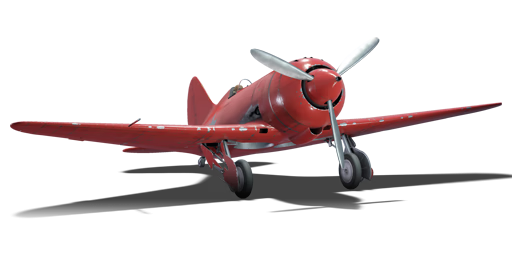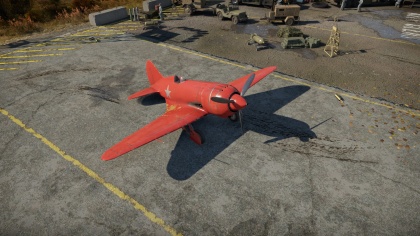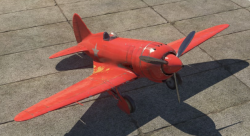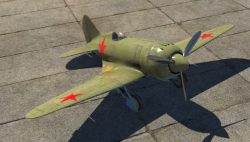Difference between revisions of "I-180S"
(→Pros and cons) (Tag: Visual edit) |
(→Pros and cons) (Tag: Visual edit) |
||
| Line 148: | Line 148: | ||
''Describe the tactics of playing in an aircraft, the features of using aircraft in a team and advice on tactics. Refrain from creating a "guide" - do not impose a single point of view, but instead, give the reader food for thought. Examine the most dangerous enemies and give recommendations on fighting them. If necessary, note the specifics of the game in different modes (AB, RB, SB).'' | ''Describe the tactics of playing in an aircraft, the features of using aircraft in a team and advice on tactics. Refrain from creating a "guide" - do not impose a single point of view, but instead, give the reader food for thought. Examine the most dangerous enemies and give recommendations on fighting them. If necessary, note the specifics of the game in different modes (AB, RB, SB).'' | ||
| − | === | + | Climb to 3500m-4000m. Proceed to use Boom & Zoom tactics on enemies. Try to drag down enemies to a lower altitude where they are an easy pick. Notable enemies are Spitfires and A6m's |
| + | |||
| + | When facing an i-180s, Avoid turnfighting or going head on. | ||
| + | |||
| + | === Engine Control === | ||
{| class="wikitable" style="text-align:center" | {| class="wikitable" style="text-align:center" | ||
|- | |- | ||
Revision as of 00:43, 10 July 2019
Contents
Description
The I-180S is a premium rank II Russian fighter
with a battle rating of 3.0 (AB/RB/SB). It was introduced in Update 1.87 "Locked On" during the "Battlefield Engineer" event.
General info
Flight performance
Describe how the aircraft behaves in the air. Speed, manoeuvrability, acceleration and allowable loads - these are the most important characteristics of the vehicle.
| Characteristics | |||||||
|---|---|---|---|---|---|---|---|
| Stock | |||||||
| Max Speed (km/h at 6,500 m) |
Max altitude (meters) |
Turn time (seconds) |
Rate of climb (meters/second) |
Take-off run (meters) | |||
| AB | RB | AB | RB | AB | RB | ||
| ??? | ??? | 10000 | ??.? | ??.? | ??.? | ??.? | 350 |
| Upgraded | |||||||
| Max Speed (km/h at 6,500 m) |
Max altitude (meters) |
Turn time (seconds) |
Rate of climb (meters/second) |
Take-off run (meters) | |||
| AB | RB | AB | RB | AB | RB | ||
| 607 | 585 | 10000 | 18.5 | 19.0 | 21.5 | 16.6 | 350 |
Details
| Features | ||||
|---|---|---|---|---|
| Combat flaps | Take-off flaps | Landing flaps | Air brakes | Arrestor gear |
| ✓ | ✓ | ✓ | X | X |
| Limits | ||||
|---|---|---|---|---|
| Wing-break speed (km/h) |
Gear limit (km/h) |
Combat flaps (km/h) |
Max Static G | |
| + | - | |||
| 420 | ~12 | ~6 | ||
| Optimal velocities | |||
|---|---|---|---|
| Ailerons (km/h) |
Rudder (km/h) |
Elevators (km/h) |
Radiator (km/h) |
| < 330 | < 320 | < 420 | > 190 |
| Compressor (RB/SB) | ||
|---|---|---|
| Setting 1 | ||
| Optimal altitude | 100% Engine power | WEP Engine power |
| 4,000 m | 1,100 hp | 1,274 hp |
| Setting 2 | ||
| Optimal altitude | 100% Engine power | WEP Engine power |
| 6,000 m | 1,000 hp | 1,158 hp |
Survivability and armour
- 8 mm Steel - Pilot's seat
Armaments
Offensive armament
The I-180S is armed with:
- 2 x 12.7 mm Berezin UB machine guns, nose-mounted (220 rpg = 440 total)
- 2 x 7.62 mm ShKAS machine guns, nose-mounted (650 rpg = 1,300 total)
Suspended armament
The I-180S can be outfitted with the following ordnance:
- Without load
- 4 x 50 kg FAB-50 bombs (200 kg total)
- 2 x 100 kg FAB-100 bombs (200 kg total)
Usage in battles
Describe the tactics of playing in an aircraft, the features of using aircraft in a team and advice on tactics. Refrain from creating a "guide" - do not impose a single point of view, but instead, give the reader food for thought. Examine the most dangerous enemies and give recommendations on fighting them. If necessary, note the specifics of the game in different modes (AB, RB, SB).
Climb to 3500m-4000m. Proceed to use Boom & Zoom tactics on enemies. Try to drag down enemies to a lower altitude where they are an easy pick. Notable enemies are Spitfires and A6m's
When facing an i-180s, Avoid turnfighting or going head on.
Engine Control
| MEC elements | ||||||
|---|---|---|---|---|---|---|
| Mixer | Pitch | Radiator | Supercharger | Turbocharger | ||
| Oil | Water | Type | ||||
| Controllable | Not controllable Not auto controlled |
Controllable Not auto controlled |
Controllable Not auto controlled |
Separate | Controllable 2 gears |
Not controllable |
Modules
| Tier | Flight performance | Survivability | Weaponry | |||
|---|---|---|---|---|---|---|
| I | Fuselage repair | Radiator | Offensive 7 mm | |||
| II | Compressor | Airframe | Offensive 12 mm | Der-31 | ||
| III | Wings repair | Engine | New 7 mm MGs | |||
| IV | Engine injection | Cover | New 12 mm MGs | |||
Pros and cons
Climb to 3500m-4000m. Proceed to use Boom & Zoom tactics on enemies. Try to drag down enemies to a lower altitude where they are an easy pick. Notable enemies are Spitfires and A6m's
When facing an i-180s, Avoid turnfighting or going head on.
Summarise and briefly evaluate the vehicle in terms of its characteristics and combat effectiveness. Mark its pros and cons in the bulleted list. Try not to use more than 6 points for each of the characteristics. Avoid using categorical definitions such as "bad", "good" and the like - use substitutions with softer forms such as "inadequate" and "effective".
Pros: Great climbrate, Great maneuverability, Great armament
Cons: Engine tends to overheat, Poor rudder
History
Development of the I-180 began in 1938, with the Polikarpov design bureau starting work on creating a new aircraft to meet the requirements of the Soviet Air Force at the time. In order to do so, engineers decided to base the new machine on a modified I-16 design and to install a more powerful radial engine. As a result, the I-180 was created. However, development and testing of prototypes was plagued with numerous issues, including many accidents. This, coupled with the arrival of new Soviet fighter designs quickly cast a shadow on the I-180 project which ultimately led to the project being cancelled by the end of 1940. Prior to the cancellation, a production version of the machine - the I-180S - was built but only in very limited numbers. In total, around 13 I-180s were built, including prototypes, but none saw any active service.
- From Devblog
Media
See also
Links to the articles on the War Thunder Wiki that you think will be useful for the reader, for example:
- reference to the series of the aircraft;
- links to approximate analogues of other nations and research trees.
External links
| USSR fighters | |
|---|---|
| I-15 | I-15 WR · I-15 M-22 · I-15 M-25 · I-15bis · Krasnolutsky's I-15bis |
| I-153 M-62 · Zhukovsky's I-153-M62 · I-153P | |
| I-16 | I-16 type 5 · I-16 type 10 · I-16 type 18 · I-16 type 24 · I-16 type 27 · I-16 type 28 · I-180S |
| I-29 | I-29 |
| I-185 | I-185 (M-71) · I-185 (M-82) |
| I-225 | I-225 |
| ITP | ITP (M-1) |
| MiG-3 | MiG-3-15 · MiG-3-15 (BK) · MiG-3-34 |
| LaGG | I-301 · LaGG-3-4 · LaGG-3-8 · LaGG-3-11 · LaGG-3-23 · LaGG-3-34 · LaGG-3-35 · LaGG-3-66 |
| La | La-5 · La-5F · La-5FN · La-7 · Dolgushin's La-7 · La-7B-20 · La-9 · La-11 |
| Yak-1/7 | Yak-1 · Yak-1B · Yak-7B |
| Yak-3 | Yak-3 · Eremin's Yak-3(e) · Yak-3P · Yak-3T · Yak-3U · Yak-3 (VK-107) |
| Yak-9 | Yak-9 · Yak-9B · Golovachev's Yak-9M · Yak-9T · Yak-9K · Yak-9U · Yak-9UT · Yak-9P |
| Other countries | ▂P-40E-1 · ▂P-47D-27 · ▂Hurricane Mk IIB · ▂Fw 190 D-9 · ▂Spitfire Mk IXc |
| P-39 | ▂P-39K-1 · ▂Pokryshkin's P-39N-0 · ▂P-39Q-15 |
| P-63 | ▂P-63A-5 · ▂P-63A-10 · ▂P-63C-5 |
| USSR premium aircraft | |
|---|---|
| Fighters | Krasnolutsky's I-15bis · I-16 type 28 · Zhukovsky's I-153-M62 · I-153P · I-180S · I-301 · ITP (M-1) |
| LaGG-3-4 · LaGG-3-23 · LaGG-3-34 · Dolgushin's La-7 · La-11 | |
| Eremin's Yak-3(e) · Yak-3 (VK-107) · Yak-3T · Golovachev's Yak-9M | |
| ▂P-39K-1 · ▂Pokryshkin's P-39N-0 · ▂P-39Q-15 · ▂P-40E-1 · ▂P-47D-27 · ▂P-63A-5 · ▂P-63A-10 · ▂P-63C-5 | |
| ▂Hurricane Mk IIB · ▂Spitfire Mk IXc · ▂Fw 190 D-9 | |
| Twin-engine fighters | I-29 |
| Jet fighters | Su-11 · MiG-15bis ISh · MiG-17AS · MiG-21S (R-13-300) · MiG-23ML |
| Strike aircraft | IL-2M "Avenger" · IL-2 M-82 · IL-8 (1944) · Su-6 · Tandem MAI · TIS MA · Su-8 · Tu-1 |
| Yak-38 · Su-7BMK · Su-25K · Su-39 | |
| Bombers | Po-2M · Be-6 · MBR-2-M-34 · Pe-2-205 · TB-3M-17-32 |
| ▂PBY-5A Catalina · ▂Hampden TB Mk I · ▂A-20G-30 · ▂B-25J-30 | |







